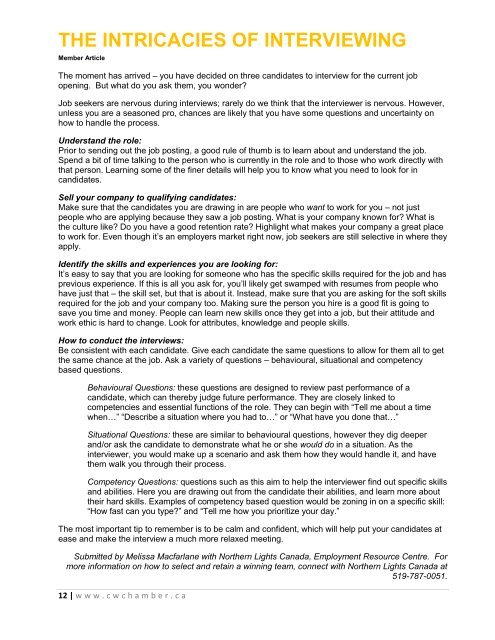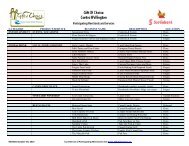Why you should take your banker to lunch Is it time to start using ...
Why you should take your banker to lunch Is it time to start using ...
Why you should take your banker to lunch Is it time to start using ...
You also want an ePaper? Increase the reach of your titles
YUMPU automatically turns print PDFs into web optimized ePapers that Google loves.
THE INTRICACIES OF INTERVIEWING<br />
Member Article<br />
The moment has arrived – <strong>you</strong> have decided on three candidates <strong>to</strong> interview for the current job<br />
opening. But what do <strong>you</strong> ask them, <strong>you</strong> wonder?<br />
Job seekers are nervous during interviews; rarely do we think that the interviewer is nervous. However,<br />
unless <strong>you</strong> are a seasoned pro, chances are likely that <strong>you</strong> have some questions and uncertainty on<br />
how <strong>to</strong> handle the process.<br />
Understand the role:<br />
Prior <strong>to</strong> sending out the job posting, a good rule of thumb is <strong>to</strong> learn about and understand the job.<br />
Spend a b<strong>it</strong> of <strong>time</strong> talking <strong>to</strong> the person who is currently in the role and <strong>to</strong> those who work directly w<strong>it</strong>h<br />
that person. Learning some of the finer details will help <strong>you</strong> <strong>to</strong> know what <strong>you</strong> need <strong>to</strong> look for in<br />
candidates.<br />
Sell <strong>you</strong>r company <strong>to</strong> qualifying candidates:<br />
Make sure that the candidates <strong>you</strong> are drawing in are people who want <strong>to</strong> work for <strong>you</strong> – not just<br />
people who are applying because they saw a job posting. What is <strong>you</strong>r company known for? What is<br />
the culture like? Do <strong>you</strong> have a good retention rate? Highlight what makes <strong>you</strong>r company a great place<br />
<strong>to</strong> work for. Even though <strong>it</strong>‘s an employers market right now, job seekers are still selective in where they<br />
apply.<br />
Identify the skills and experiences <strong>you</strong> are looking for:<br />
It‘s easy <strong>to</strong> say that <strong>you</strong> are looking for someone who has the specific skills required for the job and has<br />
previous experience. If this is all <strong>you</strong> ask for, <strong>you</strong>‘ll likely get swamped w<strong>it</strong>h resumes from people who<br />
have just that – the skill set, but that is about <strong>it</strong>. Instead, make sure that <strong>you</strong> are asking for the soft skills<br />
required for the job and <strong>you</strong>r company <strong>to</strong>o. Making sure the person <strong>you</strong> hire is a good f<strong>it</strong> is going <strong>to</strong><br />
save <strong>you</strong> <strong>time</strong> and money. People can learn new skills once they get in<strong>to</strong> a job, but their att<strong>it</strong>ude and<br />
work ethic is hard <strong>to</strong> change. Look for attributes, knowledge and people skills.<br />
How <strong>to</strong> conduct the interviews:<br />
Be consistent w<strong>it</strong>h each candidate. Give each candidate the same questions <strong>to</strong> allow for them all <strong>to</strong> get<br />
the same chance at the job. Ask a variety of questions – behavioural, s<strong>it</strong>uational and competency<br />
based questions.<br />
Behavioural Questions: these questions are designed <strong>to</strong> review past performance of a<br />
candidate, which can thereby judge future performance. They are closely linked <strong>to</strong><br />
competencies and essential functions of the role. They can begin w<strong>it</strong>h ―Tell me about a <strong>time</strong><br />
when…‖ ―Describe a s<strong>it</strong>uation where <strong>you</strong> had <strong>to</strong>…‖ or ―What have <strong>you</strong> done that…‖<br />
S<strong>it</strong>uational Questions: these are similar <strong>to</strong> behavioural questions, however they dig deeper<br />
and/or ask the candidate <strong>to</strong> demonstrate what he or she would do in a s<strong>it</strong>uation. As the<br />
interviewer, <strong>you</strong> would make up a scenario and ask them how they would handle <strong>it</strong>, and have<br />
them walk <strong>you</strong> through their process.<br />
Competency Questions: questions such as this aim <strong>to</strong> help the interviewer find out specific skills<br />
and abil<strong>it</strong>ies. Here <strong>you</strong> are drawing out from the candidate their abil<strong>it</strong>ies, and learn more about<br />
their hard skills. Examples of competency based question would be zoning in on a specific skill:<br />
―How fast can <strong>you</strong> type?‖ and ―Tell me how <strong>you</strong> prior<strong>it</strong>ize <strong>you</strong>r day.‖<br />
The most important tip <strong>to</strong> remember is <strong>to</strong> be calm and confident, which will help put <strong>you</strong>r candidates at<br />
ease and make the interview a much more relaxed meeting.<br />
Subm<strong>it</strong>ted by Melissa Macfarlane w<strong>it</strong>h Northern Lights Canada, Employment Resource Centre. For<br />
more information on how <strong>to</strong> select and retain a winning team, connect w<strong>it</strong>h Northern Lights Canada at<br />
519-787-0051.<br />
12 | w w w . c w c h a m b e r . c a







